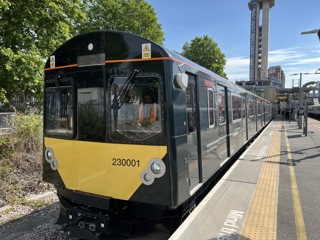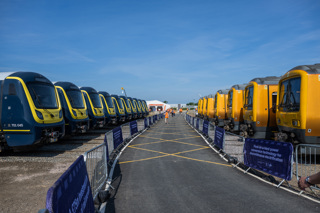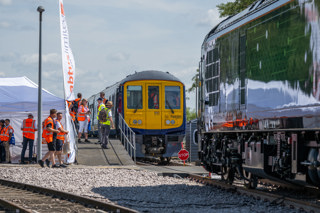 Read the peer review on this article
Read the peer review on this article
“The panel calls for a clearer focus and greater leadership from the Rail Delivery Group. An integrated system-wide approach to the challenges posed by Brexit is needed.”
That was how RailReview’s Editorial Board of industry opinion formers concluded a two-hour debate about the pressures, pitfalls and opportunities posed by a departure from the European Union.
RDG Chief Executive Paul Plummer agreed to respond. On his board sit the chief executives of Network Rail and of every major passenger and freight train operating group. Plummer is effectively speaking here for the rail industry as a whole, which is not easy because the railway does not always speak with one voice.
Plummer does not always give simple answers to straight questions, but does describe his approach to the leadership and direction demanded by RailReview’s Editorial Board.
He explains that RDG cannot represent the views of every part of the railway with a single opinion. He has to walk a tightrope between taking a view and avoiding a comment with which not all members may agree.
The interview takes place at RDG’s offices in Aldersgate Street, in the City of London. Some 300 people work there, yet at the unwelcoming reception desk in the enormous shared building, the receptionist appears not to know that its offices are on the second floor. Apart from a single sign as you exit the lift, there are no visual clues that this is the heart of the rail industry - there are no pictures on the walls, no symbols, and no logos.
In his small, glass-fronted office there is a picture of a beach. The whiteboard is wiped clean, and the view through the glass is of a grey storage cabinet. The clutter-free desk is almost devoid of paper. Unusually, there is no computer screen, just a portable tablet with a keyboard. To describe it as minimalist would be an understatement.
RDG’s website says its focus is on “four transformational portfolios”. Helpfully, it explains what that actually means:
- Today’s railway - improving punctuality, reliability and value for money.
- Customer experience - modernising ticketing and improving journeys.
- Industry reform - improving industry structures to enable excellence.
- Tomorrow’s railway - better planning for the future.
Tackling Brexit will encompass all four. The EU has been central to the way the UK’s railway is structured, operated and regulated. Its rules govern safety, signalling, train design and much more. So just what will be the likely impact of Brexit on the rail industry?
Plummer responds quietly, clearly, fluently and fast. He uses sentences that continue for whole paragraphs without pause. The punctuation, for clarity when transferred from the spoken to the written word, is added.
“We have worked quite a lot with the Department for Transport to understand that the risks of Brexit are managed in a sensible way. The potentially significant areas of potentially greater change are potentially around the broader areas of impact. How big the impact could be is clearly very uncertain. We are in uncertain times. We are looking at the impact on the supply chain, and again there is uncertainty there.
“There is opportunity as well as risk, and in uncertain times that raises concerns. Impact on our workforce is something we need to make sure we are dealing with. Impact on our relationship with other railways - us learning from them, and them learning from us - is clearly a massively important thing for everybody in the industry, and certainly one we want to continue regardless of our relationship in a legal sense.
“The biggest uncertainty beyond that is what it means in policy terms. We have a new and fresh Government, and it could be quite receptive to what we want to do.
In terms of what we stand for, we want to facilitate changes across the industry to deliver better customer experience and better benefit for taxpayers. A new Government that is open to those conversations is a great opportunity. So there is a huge breadth of impact.”
RailReview: Some parts of the industry will relish a new freedom from European regulation - local solutions for local needs. Others will have a strong commercial need to retain European harmony - for example, in common standards.
“The local solutions for local needs is a debate way beyond Europe. We are trying to push local accountability - Network Rail routes, the train operators, and their suppliers. But still working within a national network and within a common set of standards, so people are not constantly reinventing the wheel. The direction is firmly towards local business units that own their own issues.
“When you try to do that, the reasons why you cannot do so are often because Europe, the national government or the regulator is requiring something.”
RailReview: Britain has the most liberalised railway market in Europe. It is thoroughly international. Will that change?
“I hope not. Having a liberalised market with competition and choice has delivered a lot of benefits. The British model was criticised throughout Europe in its early years. Now it has largely been embraced. The agenda of liberalisation has been exported by us across Europe.
“How can we continue to evolve in this country, with the flexibility to have different solutions in different markets that suit us within this railway, while sticking to those principles? Whether we are in Europe or not should not change that.
“Europe has been imposing rules on its railways that reflect that they are not as mature as this railway in terms of separation between infrastructure and operations. The danger was that those rules, applied to our situation, could have perverse effects - actually stopping collaboration.
“Where you have separation of infrastructure and operations, you desperately need strong collaboration, strong engagement, strong line of sight from the infrastructure through the operator to the end user. The danger in the context of being in Europe was that a very simple interpretation and application of separation leaves people unable to engage with each other, because in some sense it undermines competition.
“So now perhaps we can adhere less to the black and white rules, but should continue to adhere to the broad intent and purpose of those rules.”
RailReview: The Government may not feel constrained in the future by the need to adhere to EU procurement rules. It may want to promote British jobs, British skills. The problem lies in how that will be read by the likes of Siemens, Hitachi and train operator groups that are not British.
“I am hesitant to speculate what may happen. We do want other companies to come in from overseas and to bring different ideas and perspectives. So I hope this does not inhibit that in any way. What I hear from ministers in our sector is that they are passionate about keeping Britain open for business. The message there is strong and consistent.”
RailReview: What will be the effect of the 20% drop in the value of Sterling?
“Clearly that has a massive impact on costs, particularly on rolling stock. But it is also an opportunity for us to export our expertise. A change as large as that in a short period is a shock, as it is for any industry. We have to make sure that does not lead to the wrong decisions being made for the long term.”
RailReview: Much of what you do is driven by Europe. The Digital Railway is framed by the EU. Do you fight to remain part of that when politically we are separating?
“We have massively influenced the European debate over decades. Why is it that you want a degree of commonality? It is because you can have a strong supply chain able to achieve benefit of scale, supplying our market as well as Europe.
If you talk about the Digital Railway, we have been at the forefront of that. We have bigger challenges and bigger opportunities than some other railways on our ageing network, with huge capacity challenges. The value of it for us is far greater than for other railways. We can gain more from using the Digital Railway to deliver more capacity more quickly. We can then sell that expertise to other railways.”
RailReview: From our debate, a key concern of the industry is the risk of breaking up a whole-system approach. One business might want to take advantage of lighter regulation, which may have an undesired consequence for another. How will the RDG keep everyone’s eye on a single goal?
“Across the industry we have various groups seeking to reinforce and support that. In technical leadership we are trying to join up more with the Rail Supply Group. There should be a single ownership of that big challenge, to make sure we are looking holistically at the system. RSSB has an important role in supporting that conversation, as does Network Rail.”
RailReview: European legislation frames the separation of track and train. Yet the noises from Government suggest that in the UK that will not always necessarily be the case everywhere. Are the sands shifting?
“It is sometimes unhelpful to see it in completely black and white terms. When you are already separate, you actually want to have coming together and collaboration. It is a continuum. We can sell a long-term franchise separate from the infrastructure. You can also say you want those to come together in a single integrated team.”
RailReview: You tried that with South West Trains. It wasn’t a success.
“That was two separate legal companies coming together in a collaborative way. If you look at the behaviours on the ground of those teams, one of the legacies of that closer virtual integration is that they still collaborate in a way that wasn’t happening before the creation of that legal partnership arrangement.
“This isn’t about one model operating everywhere, it is about getting teams to work together for a common purpose. That was not happening before that alliance in SWT. That model was tried and it delivered some benefits, and it is still delivering some benefits in terms of behaviours.
“The lessons from that were learned and taken to another level in Scotland, where in effect the right to bid to be in that alliance was taken through the franchise process. It is a much closer virtual and vertical integration with two legal entities that are more closely aligned. So I don’t recognise the Network Rail/SWT alliance as having failed.
“The point is that you can apply different integration models in different places. It is about collaborating between local teams in local places with aligned incentives. The issue, however you organise it, is how to get local teams working towards a common purpose.
RailReview: You have the current issue on the table. So you have seen that our panel, chaired by Len Porter, called for a clearer focus and greater leadership from the Rail Delivery Group. How will you show greater leadership?
“This organisation has been helping the Department very extensively in understanding what the effects are, and helping them to manage discussions with the European Commission. That is an important part of the leadership role, making sure that we are able to bring the expertise from across the whole membership of Network Rail, freight and passenger operators, as well as joining up with the supply chain through RSG and RIA and so on.
“I don’t see this as about Europe. Whatever model we are operating in, we need to be showing leadership, although people are very sensitive about that word. We are challenging and provoking and testing. In terms of influencing Government thinking about potential future strategy, again I am hesitant about using the word ‘leadership’. It is important to distinguish who does the guiding. In many cases, Government or the regulator need to make the decisions. The industry needs to take ownership of the things it can do - the things that are within its own control. But we need to make sure the industry is informing Government about the choices it can take to make things better.
“The RDG and its membership and stakeholders want us to challenge Government and perhaps be less accepting of the status quo. Issues of ticketing and fares are perhaps good examples of that. We know as an industry those things need to be modernised. We know we need to get agreement from Government and the regulator to do those things. My challenge is to extract the knowledge and understanding from the industry in a way that enables Government to address those challenges.
“It’s about having these conversations. It’s about enabling the debate. It’s about considering how people may do things differently, how we should inform the future of the railway. That’s what we should be doing - not telling people what they should do, but highlighting the issues which need addressing.”
RailReview: When I was reporting during the referendum campaign, it was very difficult to find anyone in the transport industry that advocated leaving the EU. The RMT union was the only exception. Given the industry was heavily in favour of remaining, what could you pull from the Brexit process as a benefit?
“We have shaped that debate, recognising that a lot of what people now see as being required by Europe has actually come from us. In terms of liberalisation we have shaped the railway over many years.
“So you need to get away from any sense that we need to discard that. You need to look at how we tweak things to live within the spirit of the referendum decision, which in most cases we will still embrace, rather than living within the strict interpretation of it.
“We must not throw away a lot of the things that have been done for the railway by the EU, and we must not limit our supply chain or limit our opportunity to export elsewhere.
“All of this requires quality engagement by the industry. We have to shape, gauge, learn and take advantage of the commercial opportunities that flow from that.”
- The Rail Supply Group and the Rail Industry Association were both invited to take part in this discussion. Both declined, stating that it was “too political”.

The position for GB rail post-Brexit is not yet clear. Paul Plummer is right in saying that it may create as many opportunities as it does challenges. RSSB will continue to assist the industry in achieving its objectives as we negotiate our exit from the EU, just as we would have done if the UK had voted to remain. There would have been challenges in both scenarios.
There is no reason to assume that the long-term development of Britain’s railways has to make a dramatic change of course as a result of Brexit, and likewise frameworks for safety and standards may not need to change much. But we do have to recognise that following the change in the way Network Rail’s debt is accounted for, we have to compete for funds along with health, education, welfare and other government departments. Any downgrading of our economy could affect rail investment.
While negotiations in the months ahead will be tough, GB rail has a strong reputation in Europe and good working relationships established over many years. As the safest major rail network in Europe, something we have achieved by creating the right
structures and approach to focus on learning and continuous improvement, we can expect that other European countries will want to continue learning from us. They regularly seek the counsel of our experts in risk, engineering, standards and human factors.
Our systematic collection of data and detailed analysis to not just understand what has happened but also what may happen underpins the safety improvements we have seen over the past 15 years. In addition, our system-wide view of trends and information means the industry has the foundations to drive improvements efficiently and effectively. Our success in this area attracts interest from our colleagues across Europe. Sharing learning, understanding and best practice will continue to be in everyone’s best interest.
RSSB currently occupies several important roles on European committees – not just on safety, but also on developing standards and ensuring supply chain efficiency. Many of these committees sit outside the EU’s constitutional framework, and include non-EU members such as Norway. While we do not know what will happen when the Government triggers Article 50 to start the process of leaving the EU, what is clear is that we will need to find a way of continuing to influence and inform our European counterparts.
Working out how future GB rail standards will integrate with European standards is essential to supporting suppliers and to the success of GB rail in importing and exporting technology and components across Europe. Standards are also an important contributor to reducing industry costs.
Just as we are exiting the EU, Network Rail’s route devolution will probably generate more local variations to meet specific needs. Local issues may well require local solutions and RSSB is here to assist in developing deviations as appropriate, carrying out risk assessments to secure these. This also applies to the way we look at system risk. Industry’s emerging data and risk strategy builds on the success of capturing and analysing data at a national level by helping our members focus on risk profiles at a local level - this will be a major boost in a devolved railway.
More than ever, there will be a stronger case for the Government to continue funding cross-industry research and development to inform short- and long-term solutions.

It is easy to get caught up in the macro debates about Brexit and what it means for our economy as a whole, for immigration and for jobs. We can also be distracted by reports on the news of legal challenges and last grasps of straws to stop Brexit from actually happening.
What the RDG seems to be doing is getting on with the job of analysing at a more micro level what Brexit could look like for the rail industry - acknowledging the risks, but also looking for opportunities and identifying areas where we don’t want much change. Brexit seems inevitable - it is important for the industry to own the problem and to influence and shape the future.
We need to keep the GB rail industry (like the country) open for business. This means finding a way to engage with the supply chain in the UK, in Europe and beyond. A lack of comment from the Rail Supply Group on this article is not helpful in this regard - we need to know what we can do to help the supply chain, and therefore engagement at all levels is paramount. Paul Plummer comments on the importance of both supply from Europe into the UK and from the UK into Europe. We don’t want to end up in a position that makes either or both of these flows unattractive for the industry.
Collaboration is another word that Paul uses a lot. As we move towards a more localised railway industry (with increased devolution), collaboration between local teams working to a common purpose is key. However, collaboration will also have wider implications. As a joined-up industry, we need to ensure that we continue to collaborate with our European cousins - gaining from their experiences and sharing ours as they move closer to opening up their markets to greater separation and competition. Brexit may mean that working together could get easier, with relaxation of rules around strict separation between operation of infrastructure and trains. Paul comments that there is an opportunity to follow less the black and white rules, but continue to adhere to a broad intent. He is right to identify that this could lead to a potential lessening of competition, and it could also lead to less transparency in the industry in relation to access to key infrastructure. We should remember that the GB rail industry implemented separation a long time prior to the rest of Europe, and (on the whole) that this has been a successful platform for the industry to grow.
The RDG often has to tread a careful line. It is held up as ‘leadership’ for the industry, yet is heavily influenced by individual members who all have diverse interests and different drivers within their businesses. Trying to represent a common voice across the whole industry is never going to be easy - particularly with some very strong voices within the RDG.
The RDG and its members need to strike a careful balance between what is good for the industry and what would work best for individual members. RDG has seemingly approached this by highlighting issues and guiding debate, rather than telling people what to do. This does mean that individual RDG members have a responsibility to lead within their organisations, and address Brexit issues as they arise in a way that is beneficial not only to them, but to the industry as a whole.

Collaboration within the rail industry and the opportunities for export of the sector’s skills come across as two key areas for Paul Plummer. His positive views on the opportunities that Brexit is likely to provide are welcome, and hopefully reflect the position taken by the majority of the members of the RDG.
Paul’s robust defence of the benefits seen in the Network Rail/South West Trains alliance, and how the lessons learned have been taken forward into other alliances such as that in Scotland, provide a good indicator of a desire to push the industry to look at the greater benefits provided by working together. It is also good to see that there is more emphasis on ‘collaboration’ rather than ‘alliances’, together with the suggestion that collaboration can be done at a local level. Arguably, this reflects the view of many members of the rail industry that we need to work together to make services work for customers, given the competition from other transport modes.
Hopefully, with the devolving of powers to the NR routes, there will be more opportunities for different forms of collaboration. The RDG needs to be a space where various models can be discussed and considered, to create a range of options that could be used. Having different forms of collaboration should be championed by the RDG, including in advising the DfT to be more accommodating of alternative models and not becoming fixed on one or two ‘preferred’ solutions, even where these are not the best fit.
If the industry is to focus more on collaboration, it should definitely grasp the nettle of ticketing. It is a difficult issue, but will not get easier and there is more pressure for smart and integrated ticketing across modes. With fewer young people having easy access to private cars and more acceptance that using public transport is OK, this should be high on the RDG’s agenda.
I take comfort from Paul’s views on the export opportunities provided by Brexit. UK industry has a strong inventive flair and a way of finding solutions to most problems. The RDG’s links into Government will be important to help focus support for export potential in the rail sector, whether through the Luxembourg Rail Protocol benefiting rolling stock manufacture and finance or the development of the Digital Railway. Rather than just looking at how we can ‘do better’ than other parts of Europe, we need the RDG to be working alongside bodies such as RIA to encourage export opportunities to all parts of the world. With the Chancellor’s Autumn Statement highlighting support for export opportunities, it is an area where we need the RDG to show a level of leadership.
Indeed, my main disappointment was to hear Paul shying away from using the word ‘leadership’ in connection with the RDG. While he is keen to emphasise the work the RDG is doing in providing a link between the industry and Government through its work with the DfT, there is a risk that such information will simply be one of a number of sources and not necessarily carry the weight of saying: “This is what we (the rail industry representatives) believe you (the Department) should be doing.”
Given that it has the word ‘Delivery’ in its title, I would like to see more publicity around what the RDG is delivering.
ollaboration within the rail industry and the opportunities for export of the sector’s skills come across as two key areas for Paul Plummer. His positive views on the opportunities that Brexit is likely to provide are welcome, and hopefully reflect the position taken by the majority of the members of the RDG.
Paul’s robust defence of the benefits seen in the Network Rail/South West Trains alliance, and how the lessons learned have been taken forward into other alliances such as that in Scotland, provide a good indicator of a desire to push the industry to look at the greater benefits provided by working together. It is also good to see that there is more emphasis on ‘collaboration’ rather than ‘alliances’, together with the suggestion that collaboration can be done at a local level. Arguably, this reflects the view of many members of the rail industry that we need to work together to make services work for customers, given the competition from other transport modes.
Hopefully, with the devolving of powers to the NR routes, there will be more opportunities for different forms of collaboration. The RDG needs to be a space where various models can be discussed and considered, to create a range of options that could be used. Having different forms of collaboration should be championed by the RDG, including in advising the DfT to be more accommodating of alternative models and not becoming fixed on one or two ‘preferred’ solutions, even where these are not the best fit.
If the industry is to focus more on collaboration, it should definitely grasp the nettle of ticketing. It is a difficult issue, but will not get easier and there is more pressure for smart and integrated ticketing across modes. With fewer young people having easy access to private cars and more acceptance that using public transport is OK, this should be high on the RDG’s agenda.
I take comfort from Paul’s views on the export opportunities provided by Brexit. UK industry has a strong inventive flair and a way of finding solutions to most problems. The RDG’s links into Government will be important to help focus support for export potential in the rail sector, whether through the Luxembourg Rail Protocol benefiting rolling stock manufacture and finance or the development of the Digital Railway. Rather than just looking at how we can ‘do better’ than other parts of Europe, we need the RDG to be working alongside bodies such as RIA to encourage export opportunities to all parts of the world. With the Chancellor’s Autumn Statement highlighting support for export opportunities, it is an area where we need the RDG to show a level of leadership.
Indeed, my main disappointment was to hear Paul shying away from using the word ‘leadership’ in connection with the RDG. While he is keen to emphasise the work the RDG is doing in providing a link between the industry and Government through its work with the DfT, there is a risk that such information will simply be one of a number of sources and not necessarily carry the weight of saying: “This is what we (the rail industry representatives) believe you (the Department) should be doing.”
Given that it has the word ‘Delivery’ in its title, I would like to see more publicity around what the RDG is delivering.

Several months on from the result of the referendum, it often feels that we are no clearer on the effects and outcomes of the vote than we were on that June morning. This is as true for the wider economic and political arenas as it is for what leaving the EU will mean for our industry. Uncertainty remains the overriding emotion as we seek to understand what the short, medium and long-term effects may be, while we get on with the job of delivering today’s railway. As we try to seek clarity and influence the future, it is important that the industry finds its voice. It was therefore fascinating to read Paul Plummer’s
comments on how we will achieve this. With such a breadth of views, opinions - and priorities - it will indeed be a tightrope to take an ‘industry’ view which satisfies everyone.
The words that leap out at me from Paul’s comments, and which he uses frequently, are ‘uncertainty’ and ‘opportunity’. Given the long-term nature of our investment, whether in infrastructure or rolling stock, it is important to avoid a state where long-term needs are clouded by short-term uncertainty. Equally, working out what and where the opportunities lie is key, and this isn’t necessarily just about Europe. The strength of our supply chain, and the progress on driving capacity through the Digital Railway, surely present worldwide opportunities.
While the future is not yet clear, it does seem that the UK has led the way in many areas where the rest of Europe is now following, in respect of separation of operator and infrastructure. One of the key priorities must be that as we move towards a more devolved and collaborative model, the ability to align even further is not lost. I would strongly endorse Paul’s view that the best way to make vertical separation work is through strong collaboration between the parties involved in delivery.
A key message is the need for the industry to take ownership of the debate, and to guide the Government to outcomes that will drive the growth and investment seen in recent years, as opposed to waiting to be led by others. Highlighting the issues that need addressing is key. Are we sure as an industry what those issues are? And if not, how do we go about gaining a view of the priorities, and tackling those? This is a clear opportunity for RDG to provide focus, guidance, and leadership.
A glance at recent and current new train orders confirms the international nature of the supply chain - our new Sleeper vehicles, being constructed by CAF in Spain, will include components from across Europe. The ability to continue to take advantage of this supply chain is key, as is the need for our own UK industry to be able to export elsewhere.
Risk, opportunity, uncertainty - they are all there in spades, and it’s good to read Paul’s initial views on how RDG can help provide the ‘clearer focus and greater leadership’ called for by the RailReview Editorial Board. The message I take above all is: let’s keep delivering and earning the industry a strong and respected voice which recognises the strengths and progress of recent years, while shaping and taking advantage of the opportunities which will undoubtedly be there in the future, in Europe and beyond.

















Login to comment
Comments
No comments have been made yet.